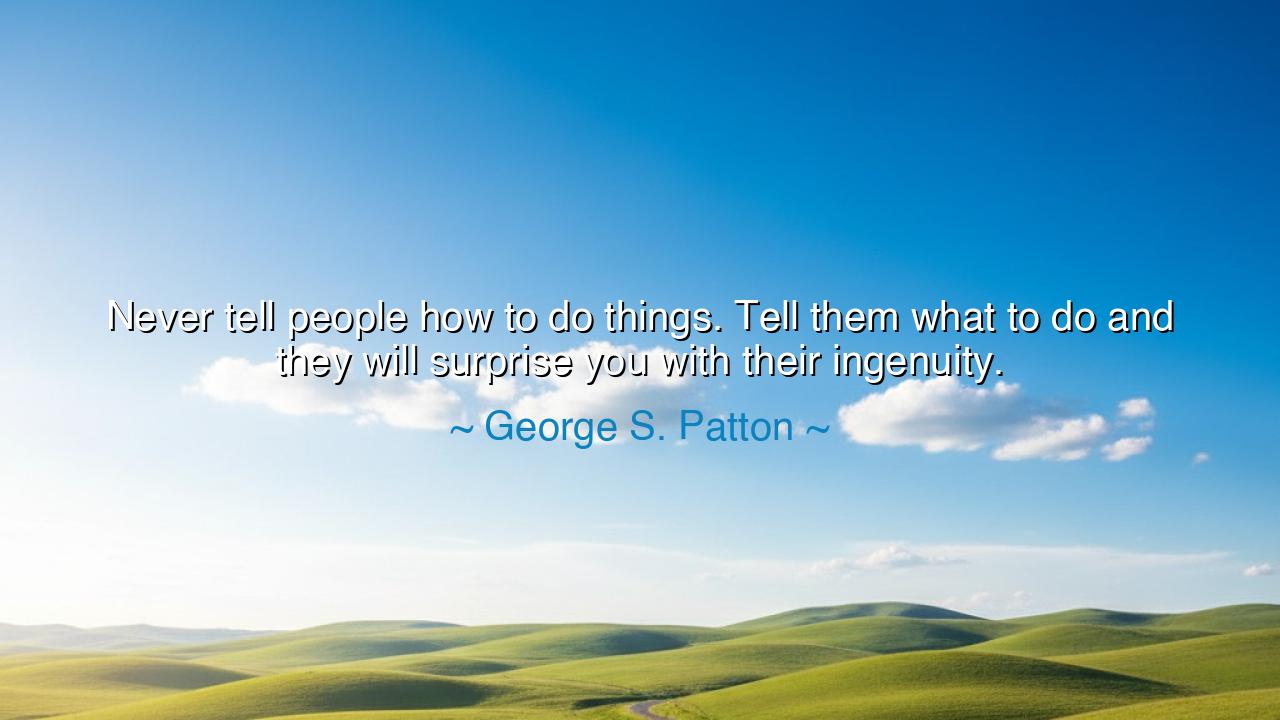
Never tell people how to do things. Tell them what to do and
Never tell people how to do things. Tell them what to do and they will surprise you with their ingenuity.






The words of George S. Patton, “Never tell people how to do things. Tell them what to do and they will surprise you with their ingenuity,” blaze with the wisdom of a general who understood the nature of men in battle and in life. To command with too heavy a hand is to smother the flame of creativity. But to give a clear purpose and grant freedom in its pursuit is to awaken the hidden strength and ingenuity of the human spirit. Patton’s counsel is not only for soldiers but for all leaders: trust those who follow you, and they will exceed even your highest expectations.
The ancients honored this principle. In Sparta, the warrior-king did not direct every strike of his soldiers but inspired them with a shared vision of duty and glory. In Rome, great generals like Scipio Africanus entrusted their centurions with freedom in the field, knowing that initiative and adaptability often meant the difference between victory and defeat. Thus, Patton’s words echo timeless truths: the greatest leaders shape direction, not detail; they command the end, but leave the means to the skill of their people.
History offers shining testimony. When Alexander the Great marched across Asia, he did not bind his men with rigid instruction. Instead, he set the grand goal of conquest and trusted his officers to adapt to the unknown terrain, cultures, and enemies they faced. Their ingenuity, unleashed by his faith in them, carved a path of victories that reshaped the world. His success lay not only in his vision, but in his refusal to dictate every action.
Patton’s wisdom also serves as a rebuke to small-minded authority. Leaders who dictate every step produce followers who cannot think, innovate, or grow. They create dependency, not strength. But the leader who gives freedom within purpose cultivates men and women who rise to their fullest height. This is the secret of enduring leadership: to see in others not only subordinates, but seeds of greatness waiting to be called forth.
Let the generations remember: ingenuity is born of freedom, not constraint. The wise leader points to the mountaintop but does not trace the path; he calls forth loyalty, courage, and creativity by trusting those who walk beside him. For men commanded like machines will act like machines, but men entrusted with purpose will act like heroes. And thus, Patton’s words remain a torch to guide every leader: show the way, then step aside, and watch your people astonish the world.






TMpham thi thanh mai
This quote really challenges the typical top-down approach to leadership. Patton is implying that you don’t need to micromanage, just set the goal and let people figure out the best way to reach it. But I wonder—how do you ensure everyone is aligned on the same vision or goal if you're not giving them explicit directions? Could this approach lead to chaos if there’s no unified understanding of the end result?
NMHUONG NGO MINH
It’s refreshing to hear a quote that values letting people think for themselves. I wonder, though—how often do we underestimate people’s ability to come up with creative solutions? Do you think this mindset could be misused by leaders who don’t want to put in the effort of guiding their team? Or is Patton’s point more about trusting people’s problem-solving skills rather than taking the easy way out?
KNHoang Thi Kim Nguyen
I can definitely see the merit in Patton's view, as it emphasizes empowering others and fostering creativity. But in some situations, it feels like there’s a fine line between encouraging innovation and simply being vague. In a world where detailed instructions are often needed to prevent mistakes, does this approach sometimes lead to frustration instead of inspiration? Maybe it works in certain leadership or military contexts but less so in others?
MMilk
I love the idea behind this quote, but there’s something that feels a little risky about it. By telling people *what* to do and not *how* to do it, you’re essentially taking a hands-off approach. Does this mean that you’re letting go of control? How can you be sure that people will indeed surprise you with their ingenuity, especially if they don’t have the right tools or resources to begin with?
PTphong trinh
Patton’s words definitely highlight the power of autonomy and creativity. It makes me wonder though, how do you strike a balance between giving people enough freedom and ensuring they’re following the right course of action? Can too much freedom lead to confusion or lack of direction? I’m also thinking about how this approach might apply in different fields—does it hold true in business, education, or creative work?